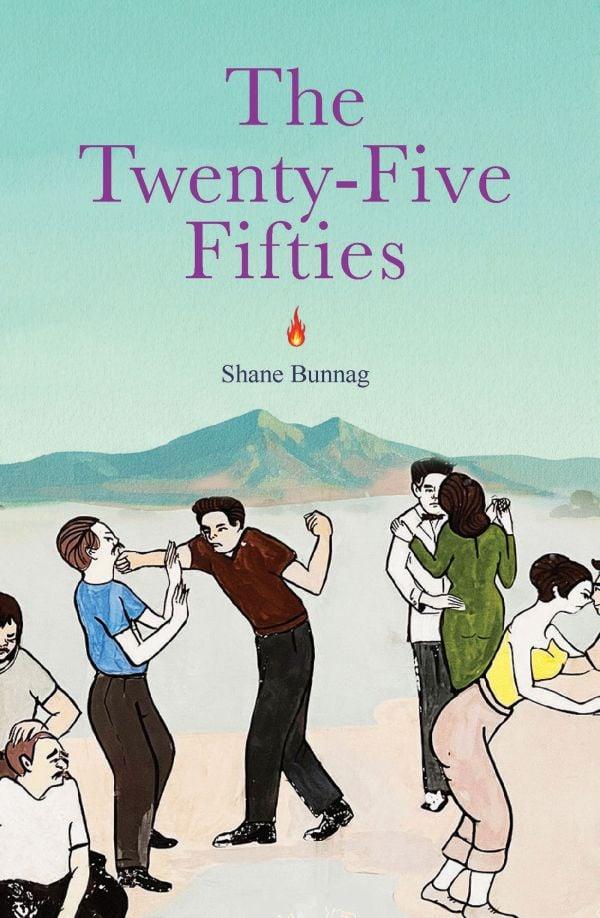
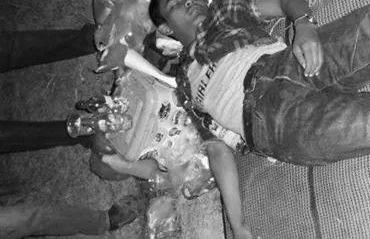



Our hero, the Boy, under the influence of a spirit, steals a motorbike, and takes to the road where he is harangued by a tramp, and given insights into the nature of time from a grilled chicken vendor and some emaciated cows, after which the Boy loses the bike, and joins a work-team cutting a road through the mountainside.
The bike had a pearl-green finish and was fully customised. Its owner had spent a lot of time on the details. The boy liked the bike from the moment he set eyes on it. Of all the bikes there at the meet, this was the one.
The boy was seventeen years old, skinny, clad in denim, body tipped with frizzled-up hair and canvas shoes. As the dancing grew wilder than joy, it turned to flailing with fists and feet. The participants trembled with excitement and forgot themselves and the boy waited, soon a keychain was just within reach. Who wouldn’t have taken it? Reasoned the voice in the boy’s head. He didn’t reckon on the voice being more than his own.
The children spoke their own language, one that the boy had never heard before. They gestured to him and refused to answer in his tongue even though they seemed to understand what he was saying. But they were kind to him.
The children took him to their house, formerly the park information centre, where they slept on the floor. They showed him how they fished in the river, and cooked their catch wrapped up in leaves.
The boy drew pictures of his motorbike in the dirt. They jabbed at the image in excitement, and he showed them how it was to ride such a beauty, until he grew disconsolate.
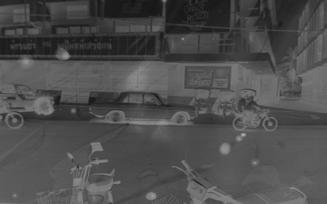
It was when the butter ran out that the search was called off. She was beside herself, and gave the boy a hug, commiserating about his bike and her plight. The lady claimed to be without merit, she gave so much but the forest never cared. He wanted to know why she did it, and the lady undid her shirt. The boy averted his eyes for a moment, then she touched him, and he looked past her sweaty beige bra at a wound on her inner arm.
Don’t listen to those girls, their heads are full of air. It’s not for vanity that I search, I have a grander scheme. My greatest desire is to graft a flower to my skin. But it must be the right bloom.
She showed him her sketches. The boy admired her draughtsmanship, the seamlessness of the lady burning up in bright orchid colours. Florid wings lifting the woman above society, out of reach of mushroom hair, and porcelain skin, and wrinkle-free faces.
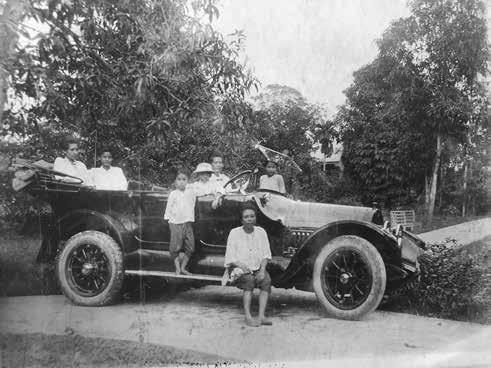

The Boy and his current patron, the fake holy man, climb to an old insurgent base, which has become a tourist viewpoint, and the Boy is finally sent on his way.
They passed through an afternoon, stopping to catch their breath along a track and to drink water at a stream. The sun beat down upon them as they stepped out into an opening in the bush. The boy felt dizzy under the light after so long in the forest. It was as if he’d stepped from a cave into the middle of a glaring desert. They made their way through a sea of waist-high grass, razor-like, that clung to their clothes and grazed their limbs as they moved. On the other side of the meadow they pushed through bamboo, as dense as a prop wall in some tele-drama. They untangled onto a stony plateau. The hermit led the way in silence. As they crossed this rocky terrain, he began to talk about the days he’d spent up there fighting the government soldiers. He touched craters and cracks in the surface. He glanced at forgotten bullet holes like old friends. Still hidden by bushes was an old artillery piece, anchored into the stone and rusted useless, a piece of historic junk.
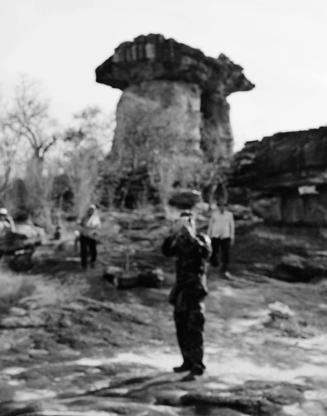
The pilgrims were ecstatic. They hugged each other like pill-heads, and cheered. But as it grew dark, they drew up chairs and sat in silence before the petrified mushroom and their rocky altar. The cold-water woman gave the boy a hotdog and a beer.
The moon rose behind the mountain, and with an eclipse was turned to umbra just as fast. The light extinguished, the devotees began to trot around the site. The boy was loath to join but insistent arms, and smiles won. He circum-ambulated. Steps vanishing in the super fine dust.
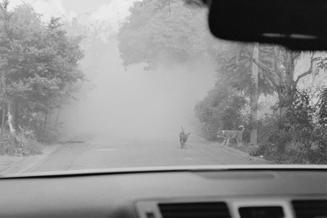
The monk finds the boy-dog a ride. At the next town, the Boy meets his former lover and becomes human again.
The visitors tittered nervously at the monk’s words. The four of them walked to a pickup truck. Here, insisted the monk, have the boy ride in the cabin. He won’t be comfortable in the back.
The monk ushered the boy up into the car. Once he had scrambled in, the boy stood on the driver’s seat witnessing as the visitors bowed for a last time to the monk.
As they pulled out, the monk gestured for them to lower the window.
Stay out of trouble young one, I have enjoyed having you here, come back one day as a human, and maybe one day help me when I’ve taken a wrong turn.
The couple in the car laughed, the boy barked.

Travelling by train and foot, he arrives in a town in time to celebrate a festival, he dreams, and is taken in by nudist villagers. Like a figure in a Hindu parable, the Boy ends up with the hermit again.
The boy boarded a southbound train at the station of the small town.
The carriage was empty. He sat looking out at the jagged hills in the distance. A road ran parallel to the tracks. The boy sneered at kids racing their scooters alongside. How pathetic they seemed on their granny bikes. He was ashamed of the passion he had once felt for the little vehicle.
Bored, the boy wandered up the carriage, changing seats, hanging around by the open door. A couple of hours later, at the next stop, he stepped off.
The Twenty-Five Fifties
The boy was still listening to the hermit’s story, in the highlands by the communist camp, which could go on for another kalpa – as the seas emptied out in noodle spoon measures and the mountains wore down with the brushing of a feather.
Bowing his head in respect to the hermit, the boy inquired if there was perhaps a short cut he could take. The reply was gnomic, and saw the boy walking into the depths of a cave.
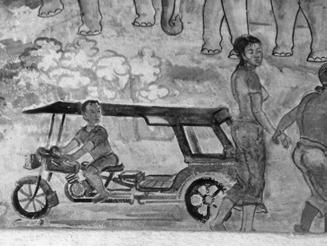
Drinking and fighting, the Boy floats along a river. Multitudes of wild animals, escapees from a private zoo, line the riverbanks, the Boy listens to a story about a tiger spirit.
The boy dangled his feet off the side of a rice barge. He gazed at the slow rolling riverbanks. The boat family was cooking, frying chillies that made him sneeze. They laughed and called out: Almost ready, come and eat. They spread out a mat on the deck and gathered round, squatting to reach into the bowls, a couple of women, men, some children. They spoke quickly, half in dialect but the boy could catch most of what they said.
The Twenty-Five Fifties
The boy was alone again, he walked, knowing that his feet were better than his head.
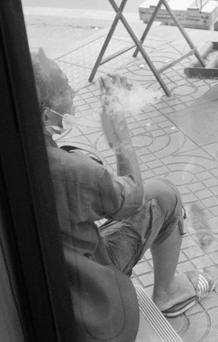
The Boy has grown old. Soldiers drive him to the city, as he makes his way through the troubled metropolis an amulet talks to him. The Boy creeps back into the forgotten suburb from whence he came, carrying a special gift from his spirit friend.
Passive and pensive, the boy was in the shade of a large rain tree when a truck pulled up beside him. The soldiers told him they had instructions to give him a ride. The boy found himself sitting with a group of young men who addressed him as elder, the boy didn’t know why.

The tide was in as he passed. He saw the spire of a temple rising out of the waves, he saw the remains of villages along the coastline. There is nothing left but to go home, he said to himself, the sea is in, and I’m no wiser.
Three coins jingled in his pocket. Feeling them, he thought of the hermit who had given them to him and of the road as he had known it.
Nearing his alleyway, the boy stepped past greying dog shit, and threw the coins over his shoulder – to dissuade any spirits that he had encountered from following. Before going home, the boy decided to stop at his girlfriend’s house.

Born in Cambridge, and raised in Greece, Shane Bunnag is Thai and British. He studied history and has worked as a filmmaker, photographer and writer. The Twenty-Five Fifties is his first novel, it draws from a time of traversing Thailand while making a series of documentaries: Walking Klongtoey, During the Flood , Elephant Shaman , and Marnram . He is the author of Chariot of the Sun, and Barbary Figs, a photography book.
www.shanebunnag.com